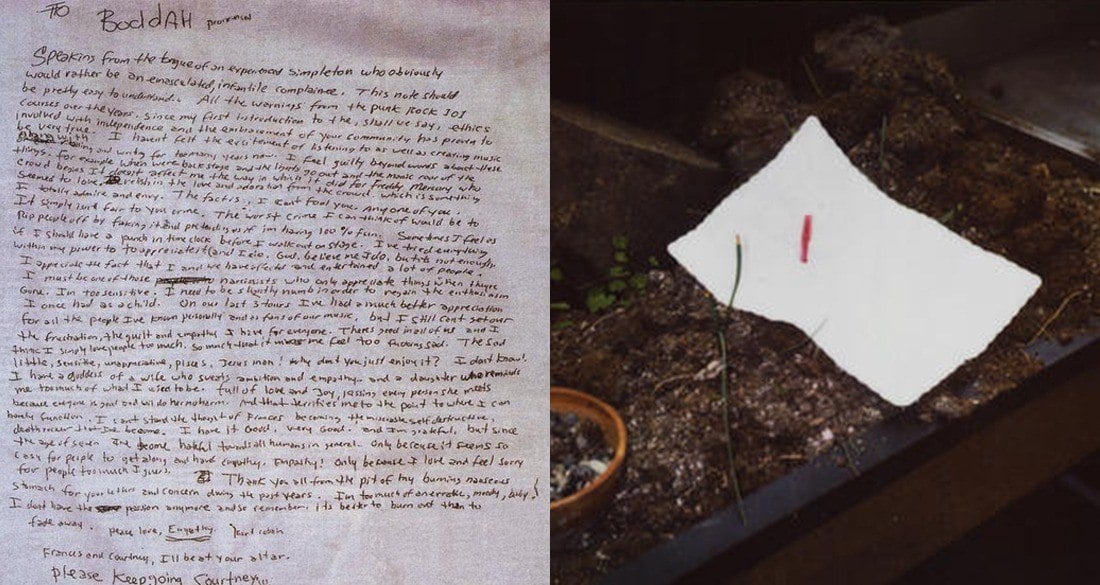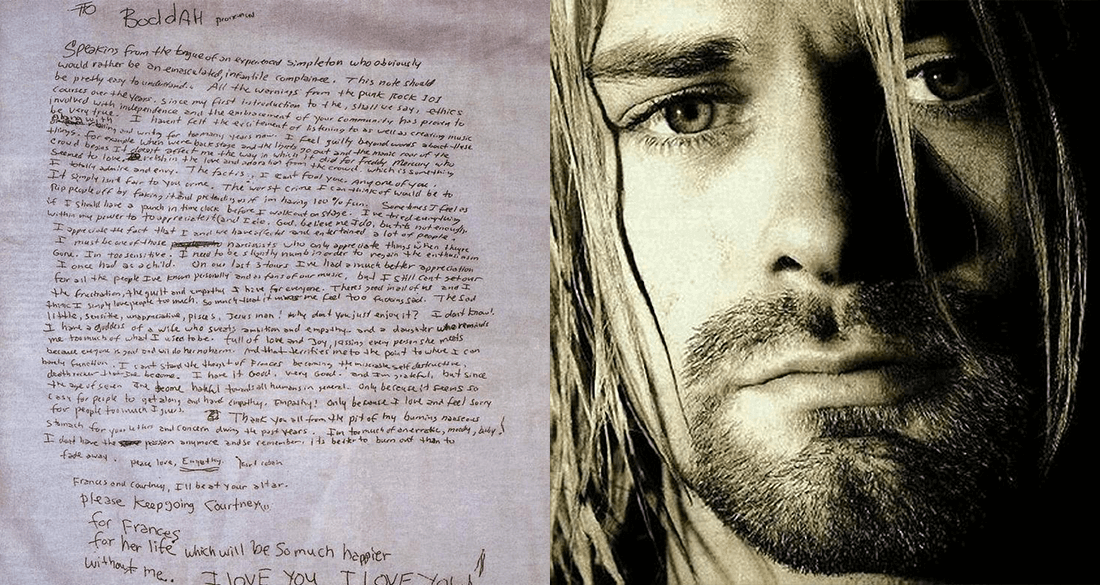When it comes to legendary rock stars, Kurt Cobain is a name that echoes through the annals of music history. His raw talent, poetic lyrics, and rebellious spirit redefined the grunge movement. But behind the fame and glory lay a deeply personal struggle, one that culminated in his tragic passing. The Kurt Cobain suicide letter remains one of the most haunting artifacts of his legacy, offering a glimpse into the mind of a genius grappling with inner demons.
For many fans, reading the suicide letter of Kurt Cobain is like peeling back the layers of a complex puzzle. It's not just a note; it's a heartfelt confession, a cry for help that went unheard. In this article, we'll dive deep into the circumstances surrounding his final days, unpacking the emotions poured into those words.
This isn't just about analyzing a letter—it's about understanding the man behind the myth. As we explore the Kurt Cobain suicide letter, we'll uncover the struggles, the pain, and the beauty of a life cut short. So grab a cup of coffee, settle in, and let's unravel the story together.
Read also:Is Jeff Bezos Jew Unpacking The Truth Behind The Rumors
- Kurt Cobain: A Brief Biography
- The Kurt Cobain Suicide Letter: What It Says
- The Context Behind the Letter
- Mental Health Struggles
- Impact on Fans and the Music Industry
- Legacy of Kurt Cobain
- Analysis of the Letter
- Tributes and Memorials
- Common Misconceptions
- Final Thoughts
Kurt Cobain: A Brief Biography
Before we delve into the dark chapter of his life, let's take a moment to celebrate the brilliance that was Kurt Cobain. Born on February 20, 1967, in Aberdeen, Washington, Kurt grew up surrounded by music. His parents were both musically inclined, and their influence sparked his love for guitar and songwriting.
Here’s a quick snapshot of his life:
| Full Name | Kurt Donald Cobain |
|---|---|
| Date of Birth | February 20, 1967 |
| Place of Birth | Aberdeen, Washington, USA |
| Occupation | Singer, Songwriter, Guitarist |
| Band | Nirvana |
| Notable Albums | Nevermind, In Utero, Bleach |
As the frontman of Nirvana, Kurt Cobain became the voice of a generation. His songs tackled themes of alienation, angst, and rebellion, resonating with millions worldwide. But beneath the surface of stardom lay a man grappling with personal demons.
The Kurt Cobain Suicide Letter: What It Says
On April 8, 1994, the world was shocked by the news of Kurt Cobain's death. Among the items found at the scene was a handwritten note that would become one of the most analyzed pieces of literature in modern history. Let’s break it down.
Content of the Letter
The letter begins with an apology to his daughter, Frances Bean Cobain, expressing regret for leaving her too soon. He writes, "I love you. I love you. I love you." These words cut deep, revealing the love and pain intertwined in his final moments.
Throughout the note, Kurt reflects on his childhood, his struggles with fame, and his battles with addiction. He mentions his "mood swings" and how they affected his life. It's a raw and unfiltered look into the mind of a man who felt trapped in his own success.
Read also:How To Become A Famous Person The Ultimate Guide To Building A Celebritylike Presence
The Context Behind the Letter
Understanding the Kurt Cobain suicide letter requires context. In the months leading up to his death, Kurt was battling severe health issues, including chronic pain and heroin addiction. His marriage to Courtney Love was also under strain, adding to his emotional turmoil.
Here are some key points to consider:
- Kurt had been in and out of rehab multiple times.
- He was known for his anti-establishment views, which clashed with the pressures of fame.
- His band, Nirvana, had just canceled a world tour due to his health issues.
All these factors contributed to a perfect storm of despair, culminating in the tragic event.
Mental Health Struggles
Mental health is a crucial aspect of Kurt Cobain's story. He openly spoke about his depression, anxiety, and feelings of alienation. In interviews, he described himself as an outsider, someone who never quite fit in.
Impact on His Life
His mental health struggles were compounded by physical pain. Chronic stomach issues plagued him for years, leading to a dependency on painkillers and eventually heroin. Despite his fame, Kurt often felt isolated and misunderstood.
According to experts, the stigma surrounding mental health in the 90s made it difficult for people like Kurt to seek help. His case highlights the importance of addressing mental health issues openly and without judgment.
Impact on Fans and the Music Industry
The loss of Kurt Cobain sent shockwaves through the music world. Fans were left reeling, trying to make sense of a world without their hero. The Kurt Cobain suicide letter became a source of comfort for many, offering a final connection to the man they admired.
In the years since his passing, Nirvana's music has only grown in popularity. Songs like "Smells Like Teen Spirit" continue to inspire new generations, ensuring Kurt's legacy lives on.
Legacy of Kurt Cobain
Kurt Cobain's influence extends far beyond his music. He redefined what it meant to be a rock star, rejecting the glitz and glamour in favor of authenticity. His suicide letter, though tragic, serves as a testament to his honesty and vulnerability.
Here are some ways Kurt's legacy endures:
- He inspired countless musicians to embrace their true selves.
- His fashion sense, characterized by flannel shirts and ripped jeans, became a cultural icon.
- His activism and support for feminist causes remain relevant today.
Kurt Cobain may be gone, but his spirit continues to inspire.
Analysis of the Letter
So, what does the Kurt Cobain suicide letter really mean? On the surface, it's a farewell note. But on a deeper level, it's a cry for help, a plea for understanding. The letter reveals a man who felt overwhelmed by the pressures of fame and the weight of his own demons.
Insights from the Letter
One of the most poignant lines reads, "I haven't felt the excitement of listening to as well as creating music, along with really writing… for too many years now." This speaks to his artistic frustration, his desire to create but feeling unable to do so.
Another striking passage is, "I feel like I’ve been traveling on a really long, strange trip. I felt like I was one of the most misunderstood people in the whole world." These words encapsulate his feelings of isolation and alienation.
Tributes and Memorials
In the wake of his death, tributes poured in from all corners of the globe. Fans organized vigils, artists covered his songs, and memorials were erected in his honor. One of the most notable tributes came from Pearl Jam, who dedicated their concert in Seattle to Kurt.
Here are some memorable tributes:
- The annual Kurt Cobain Day celebration in Aberdeen, Washington.
- A documentary titled "Montage of Heck" exploring his life and art.
- Countless fan art and tributes shared online.
These acts of remembrance keep Kurt's memory alive, reminding us of his impact on the world.
Common Misconceptions
Over the years, several misconceptions have emerged about Kurt Cobain and his suicide letter. Let's address a few:
- Myth: The letter was written in haste. Fact: Evidence suggests it was a carefully crafted message.
- Myth: He left without warning. Fact: Friends and family had noticed signs of distress.
- Myth: The letter was meant to shock. Fact: It was a deeply personal farewell.
Understanding these truths helps paint a clearer picture of Kurt's final days.
Final Thoughts
In conclusion, the Kurt Cobain suicide letter is more than just a note; it's a window into the soul of a brilliant but troubled artist. It reminds us of the importance of mental health awareness and the need to support those struggling in silence.
As we reflect on his life and legacy, let's honor Kurt by continuing the conversation about mental health. Share this article, leave a comment, or simply take a moment to remember the man who changed the face of rock music forever.
And hey, if you're feeling down, don't hesitate to reach out. You're not alone, and there's always hope. That's what Kurt would want us to remember.


